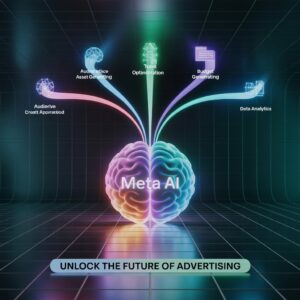Content is king. This mantra has echoed through the marketing world for years. In 2025, it remains just as true. However, the way we create, distribute, and analyze content is undergoing a seismic shift. This is driven by one powerful force: AI in content marketing.
Artificial intelligence is no longer a futuristic concept. It is a tangible, rapidly evolving technology. It is already reshaping how marketers approach their craft. From generating compelling copy to personalizing content experiences, this technology is providing unprecedented opportunities to connect with audiences. As we delve deeper into 2025, embracing the power of AI will be crucial for staying ahead in a competitive digital landscape.
Supercharged Content Creation with AI
The content creation process has traditionally been time-consuming and resource-intensive. Brainstorming ideas, writing compelling copy, and designing engaging visuals all demand significant effort. However, AI is revolutionizing this process. It offers tools that can assist with every stage of content creation. It makes the process faster, more efficient, and often more effective.
AI-powered writing assistants can generate initial drafts of blog posts, social media updates, and even email newsletters. They work based on simple prompts and keywords. Natural Language Processing (NLP) models can analyze vast amounts of data. This helps them identify trending topics and high-performing content in your niche. As a result, they provide valuable inspiration and direction. Furthermore, AI tools can assist with generating different content formats. For example, they can transform blog posts into video scripts. They can also create social media graphics from existing text. This capability allows for greater content velocity and helps marketing teams scale their output without sacrificing quality.
Case Study: “Blogify” Automates Blog Post Creation
“Blogify,” a startup focused on simplifying content creation for small businesses, leveraged artificial intelligence to develop a platform. The platform could generate complete blog posts from user-provided keywords and outlines. The AI algorithms analyzed top-ranking content. It understood semantic relationships. It then produced well-structured, informative articles. Beta testers reported a time saving of over 70% on their blog content creation. Early adopters saw a significant increase in organic traffic due to the AI’s ability to optimize content for search engines. This demonstrates the potential of AI to democratize content creation and drive tangible results.
Hyper-Personalization Through Intelligent Content
In today’s crowded digital world, generic content often gets lost in the noise. Consumers expect personalized experiences. Therefore, AI is making it possible to deliver highly relevant content to the right audience at the right time.
AI algorithms can analyze vast amounts of customer data. This includes demographics, Browse behavior, purchase history, and engagement patterns. As a result, marketers can create dynamic content that adapts to individual user preferences. For example, an e-commerce website could use AI to personalize product recommendations in blog posts. This would be based on a user’s past purchases. Similarly, email campaigns can leverage AI to tailor content and offers. This level of personalization leads to higher engagement rates. It also improves customer satisfaction and ultimately, increases conversions.
Case Study: “FitTrack” Personalizes Fitness Content
“FitTrack,” a fitness app and wearable device company, implemented an AI content strategy to personalize the content delivered to its users. The system analyzed user activity data, fitness goals, and preferences. It then curated personalized workout plans, nutritional advice, and relevant blog articles. This content was delivered directly within the app and through email. Users who received personalized content showed a 30% higher engagement rate with the app. They were also 15% more likely to upgrade to a premium subscription. This showcases how AI can enhance user experience and drive business growth through tailored content.
AI-Powered Content Optimization for Maximum Impact
Creating great content is only half the battle. You must ensure that it reaches your target audience. You also have to make sure it achieves its intended goals. This requires effective optimization. AI in content marketing offers powerful tools for optimizing content for search engines, social media, and various other distribution channels.
AI-powered SEO tools can analyze your content. They provide recommendations for improving its search engine ranking potential. These include keyword optimization, readability enhancements, and link suggestions. For social media, AI can analyze audience behavior. It suggests optimal posting times and content formats for maximum engagement. Furthermore, AI analytics tools can track the performance of your content across different platforms. This provides valuable insights into what’s working and what’s not. This data-driven approach to content optimization ensures that your efforts are focused on what delivers the best results.
Streamlining Content Workflows (AI in Content Marketing)
Managing the end-to-end content marketing process can be complex. It involves numerous tasks and stakeholders. However, AI offers opportunities to automate various aspects of this workflow. This frees up marketers to focus on more strategic initiatives.
AI-powered content calendars can help plan and schedule content across multiple platforms. They take into account factors like audience activity and trending topics. Automation tools can also assist with content distribution. They automatically share posts to relevant social media channels and email lists. Additionally, AI-powered proofreading and editing tools can help ensure the quality and accuracy of your content before it is published. This automation improves efficiency, reduces errors, and allows marketing teams to operate more effectively.
Essential AI Tools for Content Marketing in 2025
To effectively leverage the power of AI, marketers need access to the right tools. Here are some key AI-powered platforms that can significantly enhance your content efforts:
- Jasper (formerly Jarvis): An AI writing assistant that can generate various forms of content, from blog posts to social media updates, based on user prompts and templates. Visit Jasper’s Official Website.
- Copy.ai: Another popular AI writing tool. It helps users create compelling marketing copy, including website content, emails, and social media posts. Visit Copy.ai’s Official Website.
- SurferSEO: While primarily an SEO tool, SurferSEO uses AI-powered content analysis. This helps users understand what factors contribute to top rankings. It provides recommendations for optimizing their content.
- Pictory.ai: An AI-powered video creation tool. It can automatically transform long-form content, like blog posts, into engaging short videos for social media. Visit Pictory.ai’s Official Website.
- Grammarly: An AI-powered writing assistant. It helps improve grammar, spelling, punctuation, clarity, and tone. This ensures high-quality written content. Visit Grammarly’s Official Website.
These tools represent just a fraction of the growing landscape of AI. Each one offers unique capabilities to enhance the content creation and distribution process.
Tips for Getting Started with AI
Embracing AI doesn’t have to be intimidating. Here are a few simple tips for beginners:
- Experiment with AI Writing Assistants: Try using free trials of AI writing tools. They can help you brainstorm content ideas and generate initial drafts.
- Use AI for Content Optimization: Leverage AI-powered SEO tools. This will help you analyze your existing content and identify areas for improvement.
- Explore AI-Driven Social Media Tools: Discover social media management platforms that offer AI features for content scheduling and hashtag recommendations.
- Focus on Augmentation, Not Replacement: Remember that AI is a tool to assist you. It does not replace your creativity and strategic thinking.
- Stay Curious and Keep Learning: The field of AI is constantly evolving. Therefore, make a habit of staying updated on the latest trends and tools.
By taking these initial steps, you can begin to integrate AI into your workflow. You can also experience its benefits firsthand.
The Future of Content: An Intelligent Ecosystem (AI in Content Marketing)
As we look beyond 2025, the role of AI will only continue to grow. We can expect to see even more sophisticated AI models. They will be capable of generating highly creative and engaging content. AI will also play a more important role in understanding audience behavior and predicting content performance. AI in Content Marketing
However, as highlighted by resources like HubSpot, the human element will remain crucial. Marketers will need to focus on developing strong content strategies. They must understand their target audience deeply. They must also use AI as a tool to augment their creativity and efficiency. The future of content marketing will be an intelligent ecosystem. In this ecosystem, humans and AI collaborate seamlessly to deliver exceptional content experiences. By embracing artificial intelligence, businesses can unlock new levels of creativity, personalization, and efficiency. Ultimately, this will lead to stronger connections with their audiences and greater marketing success., machine learning content, NLP content, AI in Content Marketing
AI in SEO: The Ultimate Game Changer for 2025
Keyword List: AI in Content Marketing, Artificial Intelligence for Content Marketing strategies, content marketing AI, AI marketing, content automation, AI content creation, AI content optimization, content strategy AI, personalized content, 2025 marketing trends, intelligent content, machine learning content, NLP content



